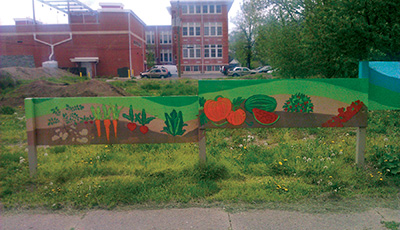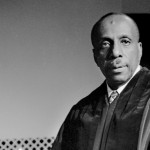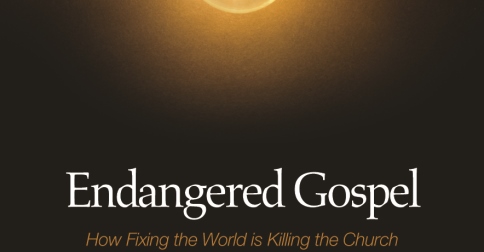
A Response to Jamie Smith…
I have a deep appreciation for Jamie Smith’s work. His latest book, Imagining The Kingdom, will most likely be one of The Englewood Review of Books’ (of which I am the editor) best books of the year for 2013, and his Desiring the Kingdom was one named one of our best books of 2009. And yet I can’t help feeling like the brilliant young philosophy professor has created a straw man in his latest blog post for Cardus: Knitting While Detroit Burns.
This post is a response to Brandon Rhodes’s recent profile of Tacoma, WA’s Zoe Liveable Church on Christianity Today’s This is Our City website. While Smith is sympathetic to much of Zoe’s story, he is concerned that it represents a knee-jerk reaction to the political and social triumphalism of previous eras (the Moral Majority of the 1980s, for instance): “While we rightly eschew triumphalism, that doesn’t mean we abandon the task of reshaping social architecture at the macro levels, since those state and federal policies impinge on micro neighbourhoods like downtown Tacoma.”
Let me lay my cards on the table here at the outset… Not only am I an advocate for Slow Church, I am sympathetic to Anabaptist political theology (often making the case, for example, for why I choose not to vote). However, I personally don’t think that what we are calling Slow Church precludes the reality that our society is going to need some major systemic changes. (I won’t presume to speak for Brandon, Zoe, or anyone else. Though I do hope that my friend and Slow Church co-author John Pattison will offer a response in due time. Part of the beauty of Slow Church, as I think of it, is learning to trust one another and collaborate together even when we have deep disagreements ). A good deal of our depiction of Slow Church in the forthcoming book is rooted in our experience here at Englewood Christian Church on the urban near Eastside of Indianapolis (I have told our story at length in the recent ebook, The Virtue of Dialogue: Conversation as a Hopeful Practice of Church Communities). Like Zoe, our social, political and economic engagement flows out of who we are as church among the particular neighbors that God has given us in our urban place. Although a good number of us refuse to vote for theological reasons (political engagement is one of the issues that we are not of one mind on), some of these very same people have had the opportunity to enter into substantial partnerships with governmental agencies at the local, state and federal level, and even with global corporations, doing work that bears witness to the just and flourishing reign of God not only in our own neighborhood, but throughout the state and the nation. One of our dear sisters, who herself spent over seven years incarcerated, has become one of the leading advocates for prison reform and restorative justice in the state of Indiana. Our pastor and his wife, who is the co-director for our widely-recognized daycare, have been leading advocates for early-childcare reform here in Indiana, testifying multiple times before the state legislature. One of the co-directors of our community development corporation was slated to tell the story of our neighborhood at a recent Washington, D.C. event with President Obama (though I believe the president had to bow out of the event at the last minute).
I tell these stories not to brag about our church, but rather to emphasize that churches can be involved in necessary systemic change without necessarily having to seek the seats of power themselves. Look at the biblical story of Daniel, who was an extraordinarily influential person in the Babylonian empire, and yet never did so by seeking the seat of power, or forsaking his identity as a member of the holy (i.e., set-apart) people of Israel.
I wish Andy Crouch’s new book Playing God: Redeeming the Gift of Power (IVP Books, October) was available now, as I think it sheds some light on the concerns I have with Jamie Smith’s arguments. I had the opportunity to have a delightful conversation with Andy about his book several weeks ago (which will appear in the next print issue of The Englewood Review of Books), and the primary argument of his book is a critique of the idea that power is wholly equivalent to violence. Specifically, he argues that there is a type of power – demonstrated by God in creation and resurrection, for instance – that is more original and superior to power that dominates and oppresses. Humans too, he argues can utilize this sort of power for the flourishing of culture, but Andy was very clear in our conversation that we need to be vigilant about the ways in which we might fall into abuses of power, particularly idolatry and injustice. He said in my conversation with him (and this is a teaser for the forthcoming ERB interview):
I just read a collection of essays by Octavio Paz, a Mexican poet and thinker, in which he tells one story of the famous Mexican revolutionary, Zapata. Zapata led a revolt, and got all the way to Mexico City. He and some of his fellow revolutionaries walk into the presidential palace, and Zapata looks at the chair where the president sits, and he refuses to sit in the chair because he’s so spooked by it. I think true institutional change comes when we acknowledge that we might have to sit in that chair, and that also changes our relationship to the people that currently sit in that chair. In every complex institution, someone’s going to have to sit in that chair, one way or another. So our job is not to get rid of the chair entirely, or avoid the chair. I think that leads to a chastened willingness to work for the good of the institution at its best, rather than a desire just to tear down the whole thing. The truth is, if you tear down the whole thing you’ll be left with diminished capacity. Honestly, I’m sure some people will read this and think, “Wow, he’s just justifying power and justifying institutions,” but you have to understand how much I’ve spent my life avoiding the chair. I do sit in one of those chairs today, within an institution of an evangelical Christianity, but it took a long time for me to be willing to do that. It was through a process of repentance, actually, that I became willing to occupy that chair. I realized if I’m not a part of something bigger than myself, I’m not a part of as much flourishing as I should be.
Although I’m still undecided about whether Christians should sit in such seats of power, what I deeply appreciate about Andy’s comments here is the recognition that Christians should not be quick to seek after such seats. In contrast to what I seem to be hearing in Jamie’s post, there are a multitude of ways that Christians can bear witness to the transforming shalom of God’s kingdom, even at the highest systemic levels of our society, without having to sit in seats of power or heed the call “to bend governing to look more like it rests on [Christ’s] shoulders.” I disagree, therefore with Smith, that “concern for the common good still requires a culture war.” As I have argued in other places, if churches can be communities that nurture the practice of civil conversation in ways that such conversation flows outward from their life together, if we embody Christ politically in practices like compassionate listening and preferring others to ourselves, then perhaps we will begin to see the culture wars dissolve, as Christians lead the way in the public square toward peaceable civil dialogue that seeks the flourishing of all humans and all creation.
Finally, I have to emphatically object to Jamie Smith’s statement that:
And let’s be honest: Slow and local is a luxury. Because slow means waiting, and those suffering injustice can’t wait.
Our primary call in Christ is not to fix the world, that’s God’s job. (And I would add, paraphrasing theologian Gerhard Lohfink, that God, unlike human revolutionaries of all sorts, does not seem to be in a hurry). Our primary call is to follow in the compassionate way of Jesus, not turning a blind eye to injustice, but rather inserting ourselves into the sufferings of our neighbors and others, and bearing the injustice with them. There is an impatience in our Western, industrial age that prefers to eliminate suffering rather than to enter into it. The problem with trying to fix the world, acting for others instead of being and acting with them, is that – as colonial patterns of development have shown – we act too hastily and in casting out one demon, we create a vacuum in which seven more demons are spawned. Following Eugene Peterson, I take Jesus seriously when he says that he is the Way. Beginning with the descendents of a single couple, Abraham and Sarah, God’s work in the world has always been slow and particular, and when I use slow, I don’t think it is always a temporal descriptor, but rather primarily a descriptor of careful and attentive action. When I have persisted in a committed relationship for many years, with my wife for instance or my church community, some decisions can be made very quickly, banking on the intimate knowledge and trust that has been cultivated over many years of care and attention.
As the story of Zoe emphasizes, and as our story here at Englewood Christian Church likewise does, in our age marked by impatience, rootlessness, and a lack of attention, slow and local are where we must begin. Maybe after years of cultivating care and attentiveness to our neighbors, God will lead us into bigger works, but our haste in desiring such works – as Andy Crouch has indicated – will wreak its own sorts of violence, as we try to fix situations without a deep and intimate knowledge of them. But if every church took seriously their call to follow in the patient and attentive way of Jesus, I think we’d all be joyously surprised by the poignant witness that would we bear to the peace and justice of Christ.
AFTERTHOUGHT: Although I have some ecclesiological qualms about it, the history of CCDA is a case study in the sort of politics I have described here. CCDA was initially about working in particular neighborhoods, and still the vast majority of their work is rooted in neighborhoods, but as they matured they found that needed to be engaged in some systemic issues that were plaguing their neighborhoods, and have been leading voices on some issues, particularly immigration reform.
——–












